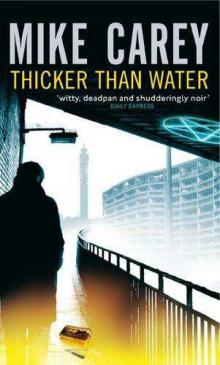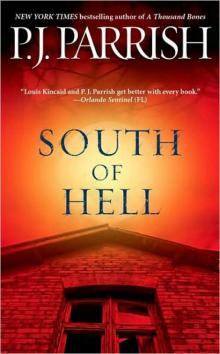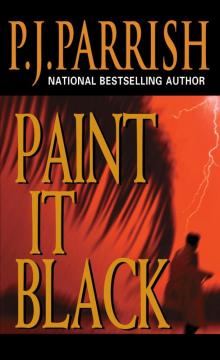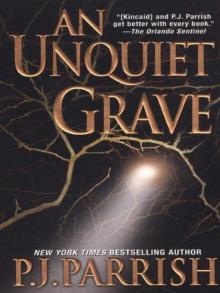- Home
- P J Parrish
South Of Hell lk-9 Page 32
South Of Hell lk-9 Read online
Page 32
Louis smiled. Then he caught Kyla’s eye over Lily’s head. She wasn’t smiling.
“I can’t come with you, Lily,” Louis said. “I just came by to tell you goodbye.”
Lily blinked. “You’re going back to Florida?”
“Yes, I have to get home.”
Questions, all those questions there in those gray eyes. But before Lily could say anything, Kyla stepped forward and put a hand on Lily’s shoulder.
“We’ll wait for you outside. Don’t be too long, okay?”
“Okay,” Lily said softly. Then, head down, she went to a bench by a full-length mirror in the corner. She sat down, taking off her hat and holding it in her lap.
Kyla watched her, then pulled Louis away. “Please don’t make any promises to her that you won’t keep,” she whispered.
He nodded. Kyla started to say something more, then just shook her head. She linked her arm through Grandma Channing’s, and the two women left without looking back.
Channing had been watching Lily and turned to face Louis. He pulled a folded paper from his breast pocket.
“Before I forget, a woman named Daphne Mayer called me yesterday looking for you. She wants you to call her.” Channing held out the paper, one eyebrow cocked. “The African-American Cultural Center?”
Louis took the paper. “It’s a long story,” he said. He hesitated, searching for just the right words. “There’s no way I can ever thank you for doing what you did, Sergeant.”
“Yes, there is,” Channing said. He tilted his head toward Lily. “Just do like Kyla said.”
They shook hands, and Channing left. The bell tinkled, and the store was quiet. Louis went to the corner.
“Lily?”
Her face came up. Tears glistened on her cheeks. “I don’t want you to go,” she whispered. “I don’t even know you yet.”
She lowered her head again, picking at the yellow ribbon on her hat. He knelt in front of her.
“We have lots of time to get to know each other,” he said. “And I won’t be far away.”
“Florida’s a long ways away. I looked on the map. And I’m afraid you’ll forget about me again.”
“I have the picture you gave me, remember? How can I forget somebody so pretty?”
She suddenly came off the chair and threw her arms around his neck, smothering him in rabbit fur and soft curls. It surprised him, and for a second, he froze. Then his arms closed around her, crushing her to him.
Lily broke away first. He was grateful she made the move, because he had no idea how she would have read it if he had. Her eyes were brighter, the tears dry.
“So, are you going to do it?” she asked.
He knew what she meant. Was he going to look for his father? He had no answer for her that didn’t sound wrong. Maybe he had no answer at all. Because, suddenly, that familiar and resounding no was not the first word that popped into his head.
“I can’t promise you that yet,” he said gently. “Can I give you a maybe?”
Disappointment colored her eyes, and she dropped her head. He touched her chin to bring her head back up.
“How about I let you know September second?” he asked.
“On my birthday?”
“Yeah,” he said. “On the ferry on the way over to Mackinac Island. If your momma says it’s okay. Is it a deal?”
She stuck out a white-gloved hand. “Deal.”
They shook on it. Then she looked to the door.
“I need to go,” she said. “If we get there late, I won’t get any of the M amp;M cookies before service.”
He pushed to his feet. “You go ahead,” he said. “Tell your momma I’ll call her when I get home.”
Lily grabbed her bonnet from the floor and hurried out of the store. He walked out behind her. Channing and Kyla were in the front of a silver Lincoln idling at the curb. Grandma Alice was waiting for him to leave so she could lock the door.
She gave him a final stern look and grunted a goodbye. She ushered Lily into the backseat and got in beside her.
The Lincoln pulled away. Lily waved from the back window. He stood on the sidewalk watching until the car disappeared.
Chapter Forty-seven
The air smelled of lilacs. The smell was so strong he stopped to look for the source, but the bushes beneath the windows of the Law Quad were still brown and bare. He walked on, the sun warm on his back.
You sure you won’t come with us?
I need to get home, Joe. Maybe…
Maybe. That seemed to be the word they said to each other most often lately.
Maybe. That’s what he had said to Lily, too.
Maybe. Suddenly, it seemed like the most pathetic word in the world.
Daphne Mayer was coming up the street carrying a cardboard tray of four coffee containers as Louis rounded the corner onto Main Street.
She saw him and smiled. “You got my message.”
“Almost didn’t,” Louis said. “I’m flying back to Florida tonight, so I thought I’d stop by.” He lunged for the door. “Sorry! Let me get that for you.”
He followed her inside. The place had been transformed since his last visit, most of the boxes restacked against a wall and the bar cleared. Some of the old cocktail lounge’s booths had been turned into desks, topped with computers. Three young black women greeted Daphne, gave Louis a glance of curiosity, and went back to their work.
Daphne delivered a coffee to each of them and came back to Louis, holding the fourth cup. “Want to split it?” she asked.
Louis shook his head. “No, thanks.”
“Mr. Coffee died this morning, may he rest in peace,” she said. “And nothing gets done around here without a lot of caffeine.”
Louis tried not to let his impatience show.
She sensed it and set her coffee down on the bar. “I guess you want to know why I called.”
“Your note didn’t say what this was about,” Louis said.
“I know. Because when we first found this, we weren’t sure it would be helpful to you,” she said. “Wait here.”
She went over to speak to one of the students, who handed her something. She came back to Louis and held out a slender book. The red leather was faded to brown, the edges rounded with wear. There was no title.
“Go ahead, open it,” Daphne said. “But be careful. It’s very fragile.”
Louis took it. The spine gave a gentle crack as he opened to the first yellowed page.
THE NARRATIVE
OF
JOHN LEPELLE
A TRUE ACCOUNT OF THE BRANDT STATION EPISODE
WRITTEN BY HIMSELF
“Brandt is the name you were looking for, right?” Daphne asked.
Louis nodded. “Where did you get this?”
“I’m not sure,” Daphne said with a sigh. “I’m ashamed to say we didn’t even know we had it until yesterday. Brenda was logging some titles into the computer, and this was just stuck in a box of textbooks. She was the one who realized it was a slave journal.”
Louis was looking at the name. John was the name Amy had spoken under hypnosis. Then it struck him: she had also said “lapel.” Could he have heard her wrong?
He looked up at Daphne. “I know I can’t take this with me-”
“You’re welcome to read it here,” she said. “You can use one of the desks in the back.”
She led Louis to a corner booth. He was about to open the journal when Daphne tapped him on the shoulder.
She held out a pair of thin white cotton gloves. “You’ll have to wear these, I’m afraid.”
“No problem.” Louis smiled slightly as he slipped on the gloves. He put on his glasses, opened the journal to the first page, and began to read.
THE NARRATIVE OF JOHN LEPELLE
A TRUE ACCOUNT OF THE BRANDT STATION
EPISODE
WRITTEN BY HIMSELF
IN THIS YEAR OF OUR LORD 1894
There are many things that are best left buried. The hurts men inflict u
pon each other, the evils that are witnessed and endured, these things can erode the heart until a human being can no longer go on. To keep silent about the past is sometimes the only way to survive. And survive is what all God’s creatures must do. But there comes a time when the silence becomes an acid that eats away at the soul. There comes a time when a man must face his past and be silent no more.
I have never told this story before. But it is a true story that needs telling for those who came after me, for those who came before me, for those who, unlike me, were not able to fly away. I tell this story only now because I am far nearer to the end of my life than the beginning and this has weighed heavy on my heart. I tell this story only now because I have been blessed with a long life lived in freedom, safe and loved in the bosom of my family. I tell this story now because my life was possible only because another life was sacrificed.
The journal was handwritten in faded blue ink in a large cursive style that looked as if the author lacked a steady hand. Louis wondered how old John LePelle had been when he wrote it.
He turned the page. The next ten pages were devoted to John LePelle’s early life as a slave in Louisiana. At thirteen, he was taken with his mother and sister to New Orleans to be auctioned off at the slave market. Given clean clothes and advised to “look lively and smart,” they were paraded before customers in a yard. Separated from his family, he worked as a field hand in Natchez. It was a life of brutality, terror, and small graces. Twice he tried to escape, and twice he was captured, the second time paying by having his right foot crushed in a vise to prevent him from running again. He was nursed back to health by a house girl named Fanny, whom he took as his wife. When John was twenty-two, they had a son whom they called Abram.
My back was striped with scars, my foot so damaged that when the cold came I could barely walk. But I saw myself a blessed man. I stood by the bed of my beloved wife as heaven placed in her arms a pure soul, in an infantile form, a new being, never having breathed earth’s air before, never having felt the earth’s goodness or its pain. Yes, they had robbed me of myself, and freedom would never be mine. But there was new life from me and from that, new hope.
Louis took off his glasses and rubbed his eyes. The shadows in the old cocktail lounge had lengthened. How long had he been reading? He put his glasses on and opened the journal again.
In the winter of 1849, John’s wife and son were sold to a tobacco farmer in Virginia. On January 3, in the dark of the moon, John slipped from his bed and began to run. Scared, starving, and crippled, he eventually crossed into Michigan, where he found shelter in stations on the Underground Railroad.
Louis began to skim the journal now, impatient to see a mention of the Brandt farm. Then, suddenly, there it was.
After dark, I emerged onto a road but I did not know which way to go. I knew only that my destination was to be a farm owned by a man named Amos Brandt. I looked in vain for the North Star but the cloud cover left nothing to light my way. Presently, I encountered a creek and had no choice but to ford its icy water. I saw in the distance a faint light, which I prayed was the safe haven I sought. I was cold and ragged, transformed into a mere ghost of a man by my long journey. And I had nothing but faith to guide me now — and the single name of my next savior, Isabel.
Louis sat back in the booth, stunned. He turned to the next page. John remained hidden in the Brandt barn for the next two days as he regained his strength for the last leg of his journey before he crossed into freedom in Canada. There were rumors of slave catchers in the area, and John knew his owner had put a bounty on his head. Isabel told John he had to leave the next night. On his last night spent in the Brandt barn, John told her about his wife and son. Isabel told him about her son, Charles, and how she worried about him growing up half black.
It is common for white men to be fathers of children by their slaves, but I had never heard a colored woman speak of a white man with love. Yet this Isabel did when she spoke of Amos Brandt. Her love, her forgiveness, this was a balm to my soul which had been so ravaged by hatred. I had no way to thank her. So I gave her the only thing of value I had — a locket that had belonged to my Fanny. It held a lock of my beloved wife’s hair and it had been warmed by its nearness to my heart.
Louis noticed that the writing in the journal had become shakier, as if the dreadfulness of what was to come next had been too much for John LePelle to record.
That last night at the Brandt farm, I awoke to a horrible noise. I heard howling dogs and horses and then the sharp voices of men. Isabel came and told me someone had betrayed her and set the slave catchers on my heels. She led me through a trapdoor and we fell down the hay chute and were quickly outside in the cold. We crept away from the barn and to the edge of the cornfields where Isabel hid me in a root cellar. There I stayed, unable to see but, God help me, I could hear. I heard a woman screaming and when I could not stand it any longer, I crept from the cellar and hid outside the barn. I saw four white men holding Isabel. Another man with eyeglasses stood apart with an expression of smothered horror and I wanted to believe this man was Amos, who could do nothing to help his beloved Isabel.
The men dragged Isabel into the barn, tied her to a hook and raised it until her bare feet just touched the dirt. I saw them whip her until her skin ran red. They wanted me and tortured her for my whereabouts. But Isabel did not betray me. I witnessed this, crouched in the weeds, my eye pressed to a gap in the boards, my body trembling with fear, my heart a dying animal in my chest.
But then I watched in dumb shock as a white woman came into the barn. As she gazed at Isabel’s hanging body I was horrified to see the barest smile tip her lips, and I realized it was she who had betrayed Isabel. The man with the eyeglasses stood at her side as if made from stone. If this was Amos, I cannot ever know. Nor can I know if his heart was as guilty as my own. But the look on that woman’s face I will carry to my grave with certainty.
What else I carry to my grave is of no concern to the readers of this journal. It is an issue between myself and the Lord. That I did nothing to help Isabel that dreadful night was to be my burden for all these years. That I turned away out of fear and ran is my shame.
Isabel died and I went on to live. I lived to become a free man in Canada. I lived to marry again, father four sons and three daughters and many grandchildren, whose abundant love has overridden my old hatreds and taught me to love in kind. I have lived sixty-eight years as a free man, except for the chains around my heart, placed there that horrible night.
The chains will be cast off only when I forgive myself. So I write this journal as the final step toward my freedom. I can only hope that the good Lord will let me make my final amends in Heaven and not in Hell.
Louis closed the journal. He peeled off the thin white cotton gloves, took off his glasses, and leaned back in the booth. The room was dark. The three students had left; their computer screens were blank. He glanced at his watch. It was almost four. His flight back to Tampa left in two hours.
He rose slowly, picking up the journal. There was one light on toward the front, and he walked toward it.
Daphne was sitting at a desk, sorting through some papers, and she looked up as he approached.
He set the journal in front of her. “There’s a long list of names in the back,” he said. “I think they might be John LePelle’s descendants.”
She picked up the journal. “Good. We’ll try to track them down. I’m sure they’d want to know where they came from.”
Louis nodded. “I’ve got to go,” he said. “Thank you again for your help.”
“Any time.”
He started toward the door.
“Mr. Kincaid?”
He turned back.
“You didn’t tell me. Did you find what you’re looking for?” she asked.
Louis hesitated, then nodded.
Back outside, he paused to turn up his collar and hurried back across campus to retrieve the rental car. He drove with the window down, the brisk April air
still bringing the smell of phantom lilacs. The Burton Tower bell was striking four as he pulled up to the red light on State Street.
A left turn led him south toward the airport. A right turn would take him across the river and up north.
He looked at his watch. It was late, but there was still time.
The light turned green. The car behind him honked once, twice.
Louis swung the wheel to the right and headed north. She was four hours ahead of him, but if he drove fast, he’d be there before dark.
FB2 document info
Document ID: fbd-e56548-aab7-0642-ae9e-a698-1fb8-58efcf
Document version: 1
Document creation date: 01.03.2013
Created using: calibre 0.9.20, Fiction Book Designer, FictionBook Editor Release 2.6.6 software
Document authors :
South Of Hell (com v4.0)(html)
About
This file was generated by Lord KiRon's FB2EPUB converter version 1.1.5.0.
(This book might contain copyrighted material, author of the converter bears no responsibility for it's usage)
Этот файл создан при помощи конвертера FB2EPUB версии 1.1.5.0 написанного Lord KiRon.
(Эта книга может содержать материал который защищен авторским правом, автор конвертера не несет ответственности за его использование)
http://www.fb2epub.net
https://code.google.com/p/fb2epub/

 South of Hell (Louis Kincaid Mysteries)
South of Hell (Louis Kincaid Mysteries) Thicker Than Water
Thicker Than Water Dead of Winter
Dead of Winter The Damage Done
The Damage Done South Of Hell lk-9
South Of Hell lk-9 A Killing Rain
A Killing Rain Dead of Winter lk-2
Dead of Winter lk-2 Island of Bones
Island of Bones Paint It Black
Paint It Black An Unquiet Grave (Louis Kincaid Mysteries)
An Unquiet Grave (Louis Kincaid Mysteries) She's Not There
She's Not There